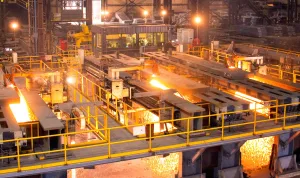Assessing the Environmental Impact of China Baowu Steel Group: A Comprehensive Analysis

China Baowu Steel Group, the world’s largest steel producer, plays a significant role in global industry and infrastructure. However, its operations also have a substantial environmental impact. This article provides an in-depth analysis of Baowu‘s environmental footprint, highlighting the company’s efforts to mitigate negative impacts through sustainable practices and innovative technologies.
Environmental Footprint of Steel Production
Steel production is inherently energy-intensive and generates significant carbon emissions. Key environmental impacts include:
- Carbon Emissions: Steel production is one of the largest industrial sources of carbon dioxide (CO2) emissions, contributing to global climate change.
- Energy Consumption: The steelmaking process consumes large amounts of energy, primarily from fossil fuels.
- Resource Depletion: The extraction and processing of raw materials for steel production deplete natural resources and impact ecosystems.
- Waste Generation: Steel production generates various waste products, including slag, dust, and wastewater, which require proper management.
China Baowu Steel Group’s Environmental Initiatives
Recognizing its environmental responsibilities, China Baowu Steel Group has implemented several initiatives to reduce its ecological footprint:
- Carbon Emission Reduction:
- Carbon Neutrality Goals: Baowu aims to achieve carbon neutrality by 2050. The company has set intermediate targets to reduce carbon emissions by 30% by 2035.
- Green Technologies: Investment in carbon capture, utilization, and storage (CCUS) technologies to reduce emissions from its plants.
- Energy Efficiency: Upgrading equipment and processes to improve energy efficiency and reduce CO2 emissions.
- Adoption of Renewable Energy:
- Renewable Integration: Increasing the use of renewable energy sources, such as solar and wind, to power production facilities.
- Green Energy Projects: Development of green hydrogen projects to replace fossil fuels in steelmaking.
- Resource Efficiency:
- Circular Economy: Promoting recycling and reuse of steel scrap to reduce the need for raw material extraction.
- Waste Management: Implementing advanced waste management systems to minimize the environmental impact of by-products.
- Water Management:
- Water Recycling: Investing in water recycling and treatment technologies to reduce freshwater consumption.
- Effluent Control: Strict monitoring and treatment of industrial effluents to prevent water pollution.
Innovative Sustainable Practices
China Baowu Steel Group is at the forefront of adopting innovative sustainable practices:
- Low-Carbon Steel Production:
- Electric Arc Furnaces (EAF): Increasing the use of EAFs, which produce steel from recycled scrap, significantly reducing carbon emissions.
- Hydrogen Steelmaking: Researching and developing hydrogen-based steelmaking processes to replace carbon-intensive methods.
- Smart Manufacturing:
- Digitalization: Leveraging AI, IoT, and big data to optimize operations, reduce energy consumption, and minimize waste.
- Automation: Implementing automated systems to improve process control and energy efficiency.
- Environmental Monitoring:
- Real-Time Monitoring: Deploying real-time environmental monitoring systems to track emissions and other environmental parameters.
- Transparency: Regularly publishing environmental performance reports to maintain transparency and accountability.
Challenges and Future Outlook
Despite significant progress, China Baowu Steel Group faces ongoing challenges:
- Technological Barriers: The development and implementation of new green technologies require significant investment and time.
- Economic Factors: Balancing economic growth with environmental sustainability can be challenging in a competitive global market.
- Regulatory Compliance: Adhering to stringent environmental regulations across different countries requires continuous adaptation.
However, Baowu’s commitment to sustainability and innovation positions it well to overcome these challenges and lead the steel industry towards a greener future.
Conclusion
China Baowu Steel Group’s operations have a profound environmental impact, but the company is taking significant steps to mitigate these effects through innovative technologies and sustainable practices. As Baowu continues to strive towards its carbon neutrality goals, its efforts will not only benefit the environment but also set new standards for the global steel industry. Understanding and supporting these initiatives is crucial for stakeholders who are invested in a sustainable future.



